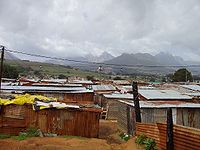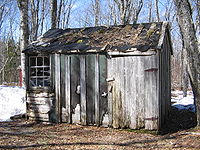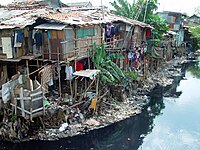Shack: Difference between revisions
ClueBot NG (talk | contribs) m Reverting possible vandalism by Milamilo to version by 45.47.168.184. Report False Positive? Thanks, ClueBot NG. (3176717) (Bot) |
SkyGazer 512 (talk | contribs) Added {{refimprove}} tag to article (TW) |
||
| Line 1: | Line 1: | ||
{{other uses}} |
{{other uses}} |
||
{{refimprove|date=October 2018}} |
|||
[[File:Shack in Pigeon Forge, TN by Zachary Davies.jpg|thumb|A large shack near [[Pigeon Forge]], Tennessee]] |
[[File:Shack in Pigeon Forge, TN by Zachary Davies.jpg|thumb|A large shack near [[Pigeon Forge]], Tennessee]] |
||
Revision as of 21:47, 14 October 2018
This article needs additional citations for verification. (October 2018) |

A shack is a type of small, often primitive shelter or dwelling. Like huts, shacks are constructed by hand using available materials; however, whereas huts are usually rural and made of natural materials (mud, rocks, sticks, etc.) shacks are generally composed of scavenged man-made materials like abandoned construction debris, repurposed consumer waste and other useful discarded objects that can be quickly acquired at little or no cost and fashioned into a small dwelling.
In areas of high population density and high poverty, shacks are often the most prevalent form of housing; it is possible that up to a billion people worldwide live in shacks.[1] Fire is a significant hazard in tight-knit shack settlements.[2] Settlements composed mostly or entirely of shacks are known as slums or shanty towns.
In Australian English shack can also refer to a small holiday house with limited conveniences, for instance it may not have running water or electricity.
In oilfield drilling (Canada) a shack can also be the word for a wellsite trailer. Structures that were once notorious among oilfield workers for being cramped, uncomfortable and generally unpleasant to be in are now no longer good enough for companies that are serious about employee retention.
-
Shacks in Kayamandi, South Africa
-
In relatively affluent areas, shacks are often used for storage or have been abandoned.
References
- ^ Planet of Slums, Verso, 2006
- ^ A Big Devil in the Jondolos: A report on shack fires by Matt Birkinshaw




